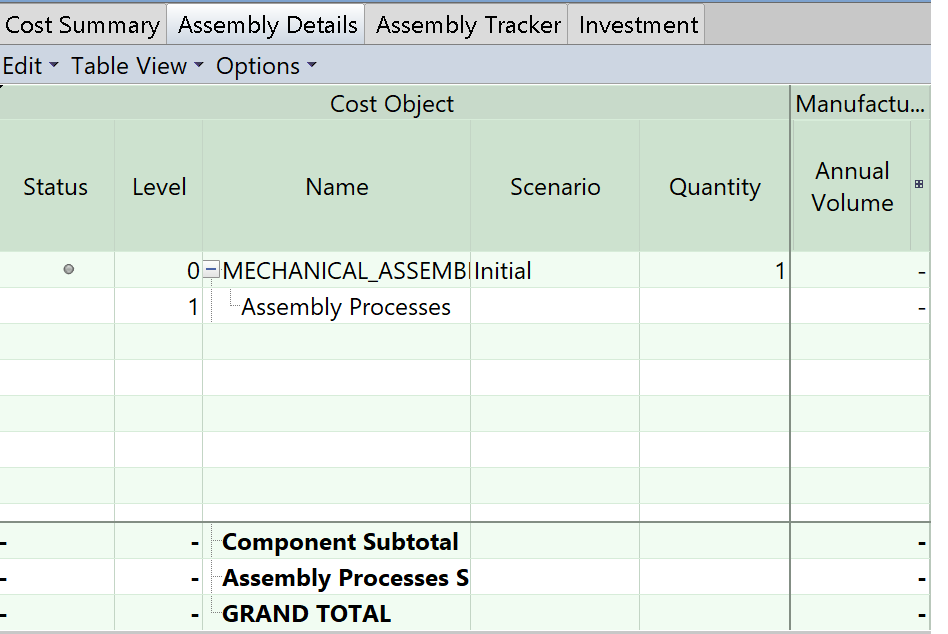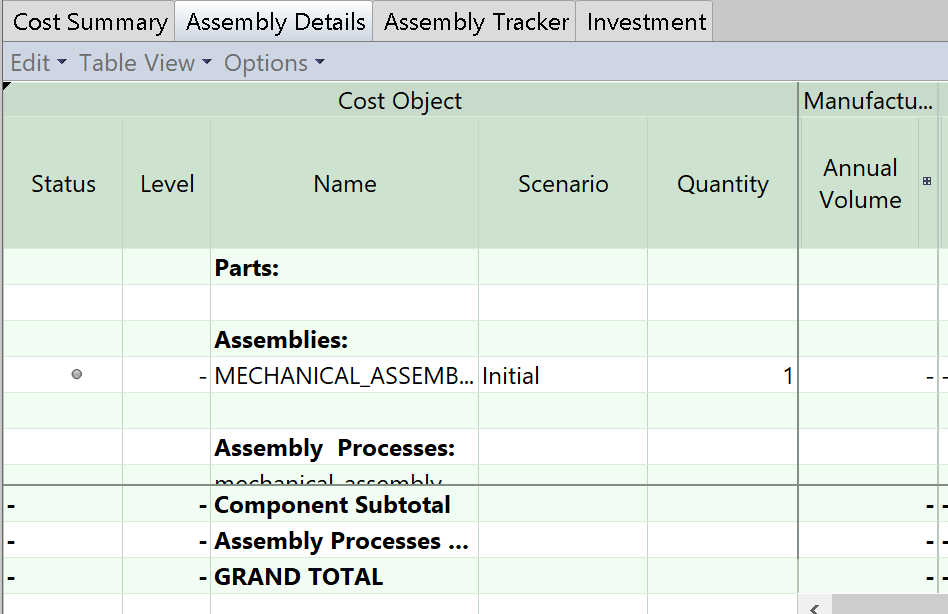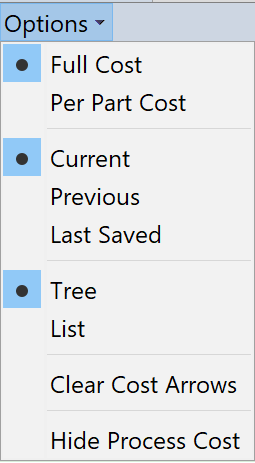View Assembly Details
See Part Details and Assembly Details Tabs for general information.
When you open an assembly, you can navigate its structure in the Assembly Details Tab (the default view)
Always visible at the bottom of the table are the total costs of all components (Component Subtotal), the total costs of all assembly processes (Assembly Processes Subtotal) and the GRAND TOTAL for the entire assembly.
Uninitialized assemblies and parts will show dashes for costs.
Each sub-assembly will provide a subtotal of its components.
Note: Use the Assembly Tracker tab to see a summary of assembly costs- see Assembly tracker. Also, see Assembly process detail for details of that tab.
List and Tree Views
The Assembly Details tab supports two main layouts: Tree (indented BOM structure) and List (component list view). You can toggle these views using the Options menu.
Tree View
This shows a tree structure identical to the assembly structure shown in the CAD application. You can expand and collapse the tree to any level, including assembly processes for each assembly and sub-assembly.
List View
This shows a flattened and sortable list of parts, sub-assemblies, and assembly processes in the top level assembly.
For example, if a part occurs 10 times at 4 different levels in the assembly, it will show up 4 times in the Tree view, but only once in the List view with a quantity of 10.
Other Assembly View Options
You can:
-
Select to either display the Full Cost of all parts in the assembly, or individual Per Part Costs.
Note: In the ‘Per Part Cost’ mode, the component costs will not add up to the assembly totals as they represent only a single part instead of all parts in the assembly.
-
Select to either display Current Values (costs reflect all inputs selected in current session), Previous Values (costs do not include your last change), orSaved Values (cost values saved in the data base) .
Assembly Details Context Menu
Right-clicking on a row in the Assembly Details tab provides access to the follow commands:
|
Menu Command |
Description |
|---|---|
|
Copy |
Basic editing commands for selected components. For example, you could copy or cut a component from one assembly and paste it into another assembly. |
|
Add |
For a selected assembly, add a component through the Search utility, or to create a new virtual component. |
|
Edit Quantity |
Specify the number of instances of the selected component. |
|
Remove |
Remove the selected component form the assembly. |
|
Switch Scenario |
If the currently selected component has more than one scenario, this command allows you to choose between them. |
|
Show Formula Dependencies |
|
|
Initialize |
If the selected row has a grey (uncosted) icon, use this command to populate the Cost Object Info window and cost the component. |
|
Open |
Open the selected component in its own tab. |
|
Save |
Commits to the aPriori database any changes to the selected component. |
|
Lock |
Allow or disallow changes to the currently selected part or assembly scenario. |
|
Ignore |
An ignored component is removed from the display, and its row in Assembly Details is greyed out. In addition, this component is removed from costing for that assembly, even if the component is a member of a deep costing assembly. Ignoring a component does not recompute any geometry and does not change the envelope dimensions of the parent assembly. So the cost of a component calculated on its own may not be the same as the cost of its parent assembly with all other components ignored. Example: an assembly has three parts: P1, P2, and P3. Costing P1 by itself gives a labor time of 30 seconds, and costing the entire assembly gives a total labor time of 120 seconds. If you ignore P2 and P3 and then cost the assembly, the labor time will probably not be the 30 seconds of the single remaining part (P1). It might be closer to the total assembly time, minus some amount for the ignored parts, as the envelope dimensions of the assembly have not been recalculated. |
|
Hide |
A hidden component is removed from the display, and its row in Assembly Details is greyed out. However, this component is still included in costing. |


